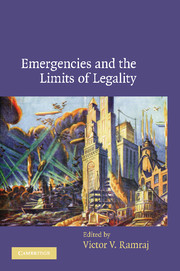Book contents
- Frontmatter
- Contents
- List of contributors
- Preface
- Introduction
- PART ONE Legality and extra-legality
- PART TWO Conceptual and normative theories
- PART THREE Political and sociological theories
- PART FOUR Prospective constraints on state power
- PART FIVE Judicial responses to official disobedience
- PART SIX Post-colonial and international perspectives
- 14 Exceptions, bare life and colonialism
- 15 The struggle over legality in the midnight hour: governing the international state of emergency
- 16 Inter arma silent leges? Black hole theories of the laws of war
- Index
- References
14 - Exceptions, bare life and colonialism
Published online by Cambridge University Press: 10 August 2009
- Frontmatter
- Contents
- List of contributors
- Preface
- Introduction
- PART ONE Legality and extra-legality
- PART TWO Conceptual and normative theories
- PART THREE Political and sociological theories
- PART FOUR Prospective constraints on state power
- PART FIVE Judicial responses to official disobedience
- PART SIX Post-colonial and international perspectives
- 14 Exceptions, bare life and colonialism
- 15 The struggle over legality in the midnight hour: governing the international state of emergency
- 16 Inter arma silent leges? Black hole theories of the laws of war
- Index
- References
Summary
I follow the strange caravan of soldiers, women and children till they reach the mountain. At the top the leader of the soldiers plants a flag between two slabs of rock and proclaims Martial Law. He sings a song which, he boasts to the women and children, is his ‘national anthem’. ‘God save the Queen’, the soldiers all say in unison…. To my horror I find the women and children on their knees, licking the rocks around the flag, the leader of the soldiers egging them on with mad glee. ‘Clean it up!’ he shouts dementedly, waving his bayonet near their terrified faces. The other soldiers stand by and threaten the ones who refuse to lick. A woman gets shot. Another suddenly stands up and rushes towards the cliff. She plunges to her death. ‘This is what will happen to you if you don't clean the rocks’, the leader says, his complexion pink and slightly sunburnt.
Terror becomes total when it becomes independent of all opposition; it rules supreme when nobody any longer stands in its way. If lawfulness is the essence of non-tyrannical government and lawlessness is the essence of tyranny, then terror is the essence of totalitarian domination.
Introduction
According to Carl Schmitt, the exception constitutes a norm-less – or nearly norm-less – space. In the state of exception, ‘the state remains, whereas law recedes…the norm is destroyed in the exception’.
- Type
- Chapter
- Information
- Emergencies and the Limits of Legality , pp. 337 - 359Publisher: Cambridge University PressPrint publication year: 2008
References
- 2
- Cited by



